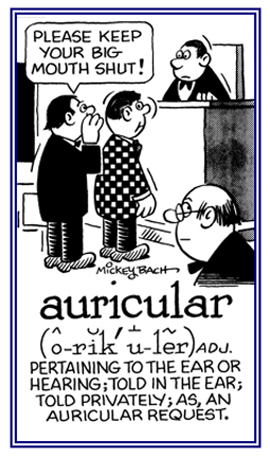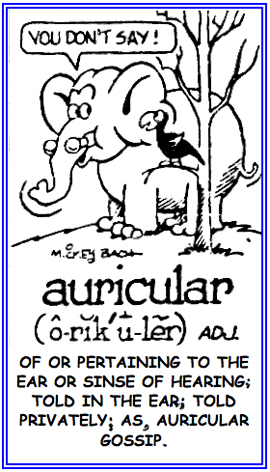-ular
(Latin: of, relating to, or resembling; compound of the suffixes -ule, "little, small" and -ar, "pertaining to, of the nature of, like"; and so, -ular is a combining form meaning: referring to something "specified": appendicular, molecular, pedicular; as well as, a combining form meaning "resembling" something specified: circular, globular, tubular)
2. Characteristic of something which is perceived by or spoken into the ears: An auricular communication or statement is perceived via the body parts that function so people can listen.
The reception of words by a person when listening to others is an auricular process with the ears.


Go to this Word A Day Revisited Index
so you can see more of Mickey Bach's cartoons.
Dr. MacSween told Ralph that the avascular blood vessels and other tissues in his body were unable to provide sufficient blood to his bones and other body organs.
Some plants can also have avascular systems which are not able to carry sufficient water and nutrients throughout their systems.
2. Regarded as characteristic of an uncle, especially in benevolence or tolerance; like an uncle in kindness or indulgence.
3. In medical genetics, pertaining to an aunt or uncle.
4. Etymology: from the Latin avunculus, "maternal uncle". The feminine equivalent of avuncular is materteral, "like an aunt".
An avuncular relationship is the genetic relationship between aunts and uncles and their nieces and nephews.
Dwight David Eisenhower, as U.S. President (1953 to 1961), was the amiable uncle, but his reputation as an indifferent manager evaporated once scholars got a look at his papers, which showed a much more engaged and sophisticated player than the avuncular image he cultivated.
"He himself [Josemaría Escrivá] was a polarizing figure, humble and grandiose, avuncular and ferocious."
2. With two eyepieces, as in a binocular microscope.
3. Involving or using both eyes, or relating to vision using both eyes.
As stated above, binoculars are field glasses adapted to the use of both eyes, in contrast with the telescope, which is a monocular instrument.
"Oysters and mussels, permanently attach themselves to hard surfaces as adults and the foot is sedge-shaped and is used for digging in the sand or mud where they secrete tough attachment threads."
2. Relating to or especially immediately preceding or following the heliacal rising of Canicula (the Dog Star); "canicular days."
3. Etymology: Latin canicularis through French caniculaire.


